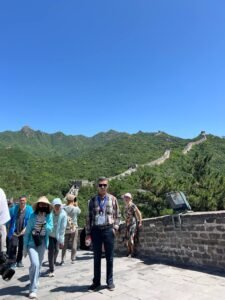العالم الآثاري المصري الدكتور محمد شبانة يكتب: سلسلة رحلتي إلي الصين: قوة الصين الناعمة – الصين تكسب الاحترام (10)

من خلال هذه الرحلة، أدركت أن القوة الناعمة التي تمتلكها الصين ليست في الإعلام أو السياسة فقط، بل في طريقة تعاملها مع الآخر. الصين تُقدّم نفسها للعالم بهدوء، لا تفرض حضورها، بل تُقنع به.
ما رأيته من تنظيم، واحتراف، وكرم، ورغبة صادقة في بناء جسور التعاون، يوضح أن الصين تريد أن تكون جزءًا إيجابيًا من العالم، شريكًا لا خصمًا، وصديقًا لا منافسًا.
قوة الصين الناعمة
خلال رحلتي ومتابعتي للفعاليات الثقافية والعلمية التي تنظمها الصين، تأكد لي أن الصين لا تكتفي بقوتها الاقتصادية والسياسية فقط، بل تسعى بذكاء إلى تعزيز قوتها الناعمة كجزء أساسي من استراتيجيتها العالمية.
الصين تستثمر بكثافة في بناء علاقات ثقافية وعلمية مع دول العالم، وخاصة دول العالم الثالث والدول النامية، من خلال استضافة بعثات علمية، وتنظيم مؤتمرات وفعاليات تبادل ثقافي، وتقديم الدعم العلمي والتقني.
هذه الاستراتيجية الذكية تهدف إلى بناء صورة إيجابية للصين، تفتح لها أبوابًا أوسع للتعاون التجاري والسياسي، وتخلق علاقات مبنية على الثقة والاحترام المتبادل، بدلاً من الاعتماد فقط على النفوذ الاقتصادي أو القوة الصلبة.
كما أن هذا التوجه يُعد جزءًا من مبادرة “الحزام والطريق” التي لا تقتصر على المشاريع الاقتصادية فقط، بل تشمل بناء جسور ثقافية وإنسانية تعزز من تأثير الصين على الساحة الدولية وتكسبها شركاء دائمين في التنمية والتقدم.
في النهاية، قوة الصين الناعمة تعكس وعيًا استراتيجيًا رفيعًا بأن التأثير الحقيقي والمستدام يبدأ من العلاقات الإنسانية والثقافية التي تخلق قبولًا وتفاهمًا عميقًا بين الشعوب والدول.
الصين وشعوب العالم النامي: ذاكرة الاستعمار ومفهوم الشراكة
من النقاط العميقة التي لمستها خلال الرحلة، والتي تستحق أن تُبرز بشكل مستقل، أن الصين أقرب نفسيًا وحضاريًا إلى شعوب العالم الثالث والدول النامية، خصوصًا تلك التي عانت من الاحتلال والاستعمار الغربي.
فالصين ليست قوة استعمارية تقليدية، بل دولة عرفت الاحتلال، وتعرضت للتفكك والإهانة الأجنبية. وهذا التاريخ يجعل خطابها في التعاون والشراكة أكثر صدقًا وقبولًا لدى الشعوب التي عانت من التجربة نفسها.
في المقابل، ما زالت العديد من الدول النامية تنظر إلى النموذج الغربي – رغم تطوره – بعين الريبة، باعتباره استمرارًا لعلاقات الاستغلال ونهب الثروات، حيث تسود في الوعي الجمعي صورة “السيد والتابع” لا “الشريك المتكافئ. ”
أما النموذج الصيني، فهو يقدم نفسه بمنطق “الكل رابح” (Win-Win Deal)، ويؤسس لعلاقات تقوم على المصالح المتبادلة، والاحترام المتبادل، والتفاهم طويل الأمد، مما يجعله أكثر قبولًا على المستوى النفسي والثقافي، لا سيما في العالم العربي والإفريقي وآسيا الوسطى.
هذا البعد النفسي غير المرئي غالبًا هو ما يمنح الصين قوة تأثير هادئة ومستقرة، ويجعلها تبدو – في نظر كثير من الشعوب – كطرف صادق في بناء شراكات لا تعيد إنتاج علاقات الهيمنة، بل تفتح آفاقًا جديدة للتعاون والمستقبل المشترك.
دروس مستفادة
الصين تُعلّمنا أن النهضة لا تعني الانسلاخ عن الذات، بل الانطلاق منها. وأن التقدم لا يعني الاستعلاء، بل الخدمة. وأن التواضع، حين يكون مدروسًا، أقوى من كثير من ضجيج القوى الكبرى. (يُتبع).

My Journey to China Series: China’s Soft Power- Winning Respect (10) by Dr. Mohamed Shabana, Egyptian Archaeologist.
During this journey, I realized that China’s soft power is not just a matter of media or diplomacy, but a lived reality you can feel in every detail — the organization, professionalism, hospitality, and the sincere desire to build bridges of cooperation. It was as if China were saying, clearly and calmly: We want to be a positive part of the world — a partner, not a rival; a friend, not a competitor.
China’s Soft Power: Winning Respect
As I followed the cultural and academic events organized during our visit, it became clear that China is not content to rely solely on its political, economic, or military strength. Rather, it is strategically investing in soft power as a core component of its global outreach.
China is building strong cultural and scientific ties with many countries, particularly in the Global South, by hosting academic delegations, organizing cultural exchanges, and offering scientific and technical support.
This thoughtful strategy opens wider doors for commercial and political cooperation, creating relationships built on mutual trust and respect — far removed from models based purely on economic leverage or hard power.
These efforts are also integral to the “Belt and Road Initiative,” which goes beyond infrastructure and trade to build human and cultural bridges that strengthen China’s presence on the global stage and foster long-term partnerships in development and progress.
Ultimately, China’s soft power reflects a strategic awareness that true and lasting influence comes from cultural and human connections — relationships that generate trust, understanding, and acceptance between nations and peoples.
China and the Global South: The Legacy of Colonialism and a New Model of Partnership
One of the deeper insights I gained during this visit — and which deserves special attention — is that China shares a unique psychological and historical closeness with the nations of the Global South, particularly those that suffered under colonial occupation, such as many Arab, African, and Asian countries.
Unlike traditional Western powers, China itself endured occupation and humiliation, and still carries the memory of foreign domination. This shared historical pain allows its message of partnership and respect to resonate more deeply with nations that have experienced exploitation and marginalization.
By contrast, many developing countries still view the Western model — despite its modern rhetoric — through the lens of historical exploitation. In the collective memory of formerly colonized societies, Western involvement often evokes images of dominance and extraction, not partnership or mutual benefit.
China, however, offers a different tone. Its “Win-Win Deal” model emphasizes balanced cooperation, long-term investment, and mutual respect. This makes its approach feel more sincere and psychologically acceptable to many societies that remain wary of neo-colonial attitudes.
This invisible yet powerful psychological dimension is one of China’s greatest advantages — enabling it to win hearts quietly and gradually, and to position itself as a sincere ally, rather than a dominant force seeking markets and control.
Lessons Learned
China teaches us that renaissance does not mean alienation from oneself, but building upon one’s roots. Progress does not imply arrogance but service. And humility, when deliberate, is stronger than much of the noise from great powers….. to be continued





